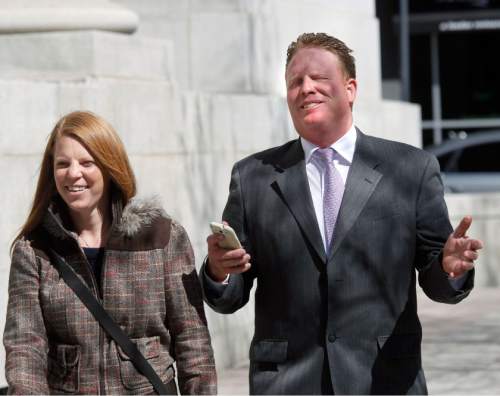This is an archived article that was published on sltrib.com in 2014, and information in the article may be outdated. It is provided only for personal research purposes and may not be reprinted.
With technical issues largely solved, the federal fraud trial of St. George businessman Jeremy Johnson and four former officers of his companies seemingly inched closer to a March trial.
But at a Thursday hearing, U.S. Magistrate Judge Paul Warner indicated motions to challenge evidence or affecting other aspects of the fraud case might cause further delays.
Still, Warner said, he was leaving the March 2 trial date intact — at least until the next hearing set for Jan. 13 in Salt Lake City's federal court.
Johnson and others face 86 charges related to the operation of I Works, the embattled businessman's online marketing company, in a case that stretches back to June 2011.
Eric Wheeler, a computing expert hired by the court, told Warner and assembled attorneys that a database containing much of the evidence in the case is mostly complete and he would show defense lawyers how to access it.
The database contains millions of documents and emails that were part of the I Works operation, which was taken over by the Federal Trade Commission after it sued Johnson and others in December 2010. In the still-pending civil case, the regulatory agency alleges I Works defrauded customers by charging credit or debit cards without adequate disclosures on Web pages and made false claims about products.
But one of Johnson's attorneys, Chelsea Koch, told Warner that the defendants still want access to a computer server that was taken by a former I Works employee after he apparently didn't get paid when the FTC shut down the company.
Warner urged Koch to take any necessary legal steps to recover the server.
The criminal case grew out of the FTC lawsuit in Las Vegas. Prosecutors allege Johnson and others engaged in bank fraud when they set up merchant accounts for shell companies to continue to process credit and debit cards after other banks closed processing accounts because of a large number of customer chargebacks.
Johnson and the four other defendants have pleaded not guilty. They contend the banks knew of and even participated in setting up the shell companies.
Johnson also is at the center of some of the allegations against former Utah Attorneys General Mark Shurtleff and John Swallow, both of whom face multiple criminal charges related to their official duties or campaigns for office.



